
Extreme Teaching in the Top End
School
Date
Language Program
St Francis Xavier Catholic School, Daly River (NT) Australia.
December 2016
English as an Additional Language or Dialect (EALD)
“If you happen to look out at the right time, you can see the crocs lying on the river banks.” Yes, these are actual words spoken to me by a classroom teacher – and it was the truth. I had found myself inside a senior classroom at a remote school in the Northern Territory, some 220kms south from Darwin.
Standing at the front of the room, whiteboard behind us, my colleague pointed to his right, where out the window, the mighty Daly River ran it’s course. I looked hard but I didn’t see any crocodiles. Maybe tomorrow.
This was my first visit to the Top End and as it turned out, I was completely unprepared. The first thing I noticed when I arrived here was of course the heat. How could you not? Peeling myself away from the comfort of my air-conditioned transport vehicle, I had stepped out to my new surroundings and was immediately smashed in the face. The heat of the scorching sun was one thing but the humidity was something else and quite unlike anything I had experienced before. Every pore of my body was perspiring and my lungs felt as though they were working overtime to inhale the thicker air. It was the first time (but certainly not the last time) that I wondered how people lived in such weather conditions, day-in and day-out.
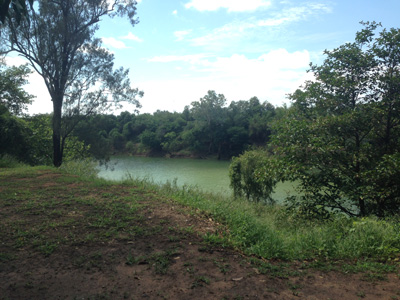
The mighty Daly River, NT.
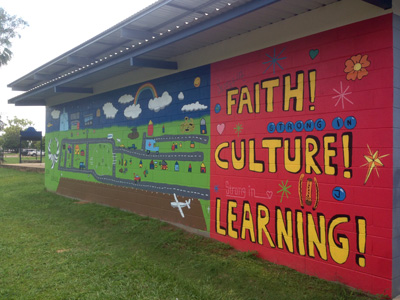
St. Francis Xavier Catholic School values.
I was here in this remote Indigenous community, Nauiyu, to spend some time working with and learning from the staff and students at St Francis Xavier Catholic School. Here there are ten local languages spoken, a result of the merging of multiple tribal groups.
The students themselves all understand English and speak ‘Aboriginal English’ whilst at school – most of the time. They occasionally take advantage of their ignorant ‘White Fella’ teachers and when feeling annoyed, they make all sorts of inappropriate utterances in language.
These of course cannot be understood by their teacher but their classmates respond in fits of hysterical laughter. “You grow a thick skin pretty quickly – and you pick your battles.” I was told by a colleague. Some battles are better left un-fought.
Teaching here is tough. Mainly because there are so many different challenges that simply don’t exist in schools back home. A range of cultural issues and problems within the community impact school life for these kids. These are issues that I could never possibly understand in such a short time, maybe not ever.
Culturally, I never will. A majority of these issues stem from the era of the Stolen Generations, a bleak time in Australian history. Many of the students here are the grandchildren of those who were taken during the 1960’s. I cannot begin to comprehend what life meant for these people. And so with this knowledge, I grew increasingly aware that I was a ‘blonde white lady from down south’ and very much an outsider of the area.
As the days passed, I observed with fascination the relationships that had formed between the teachers and their classes. It was the end of a school year and it had been a bumpy journey to reach this point. These teachers have worked extra-hard on a whole other level, all year long. But it had paid off.
“One of the biggest successes this year has been with Stacey.* At the start of the year, she wouldn’t even try… “No I can’t do it – you do it.” she would say any time I gave her some work.”
Now Stacey has climbed several reading benchmark levels. No mean feat when attendance levels are of concern. Another classroom teacher shared the story of her young ASD student:
“Jason* has his own language. Not Indigenous and it’s not understood by anyone – it’s his own made-up language. At the start of the year there was no communication (from him) at all. But now, he can string words together to make sentences in English. They’re not complete, proper sentences but he can at least communicate basic things.”
And I think you’ll find that success stories such as these are the reasons why teachers everywhere, but especially here, work as hard as they do. Teaching is not something you just ‘do’ if you don’t love it – nor should you. I was curious though; what brought this group of teachers, each hailing from various states across Australia, to this small and stifling-hot part of the country?
Most had worked in remote communities around Australia before and had therefore wanted to return. Some were new to the Top End. And others? Well, others knew that coming to teach here was part of their destined path as a teacher. As much as it was challenging, it was also incredibly rewarding; moreso than in mainstream schooling.
The kids start school with a lower literacy level because they have English as an additional language or dialect (EALD). So when they progress in leaps and bounds – which they do – it is an absolute delight to see! I sat in on a ‘buddy’ lesson in which the senior students had joined the junior class to do some shared reading.
The younger students listened to the Indigenous stories being read to them in English by their older peers. If there were any words or phrases that they didn’t understand, the bigger kids would translate it for them into their language. It was so lovely! And this is exactly what it’s about here – linking literacy to real-life.
For these kids, authentic and purposeful learning involves doing things like taking the schools’ Land Rover and driving out to collect bush tucker. The senior teacher took his class and I to the local billabong to go ‘Lilying.’ This basically involved me standing back on the edge of the billabong (sweltering in the 43.5 degree heat and about 1000% humidity) whilst the students bounded fearlessly barefoot towards the muddy beds, plucking at the water lilies in search of the green pods.
I watched transfixed, as they disappeared from view. Occasionally a head would pop up from somewhere and the giggles could still be heard. But this was all part of their learning. Later back at school, this experience could be turned into a writing task; a narrative perhaps or a procedural text. Today however, the teacher hoped that the girls would find inspiration from this session to use in their Indigenous artwork.
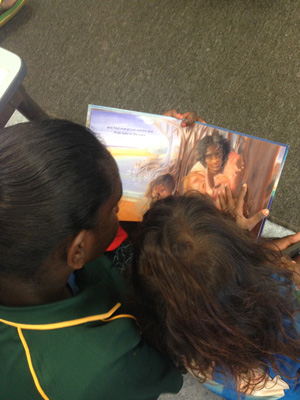
Shared reading time is always a special time of the school week.
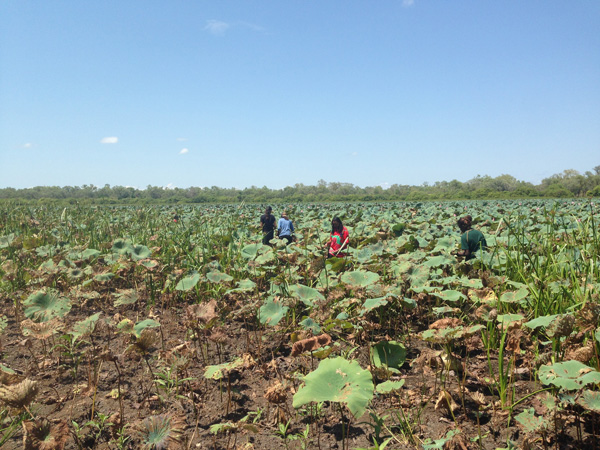
Authentic learning; searching for Bush Tucker.
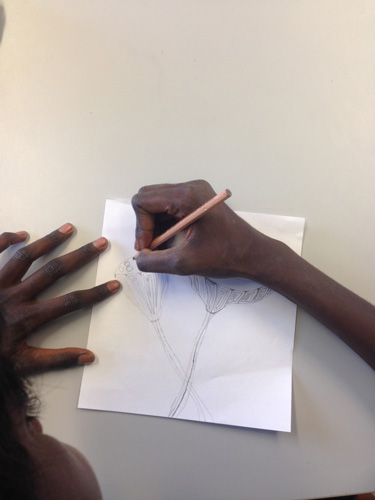
Beautiful pieces in-the-making. It’s hard not to find inspiration when one is surrounded by so much natural beauty!
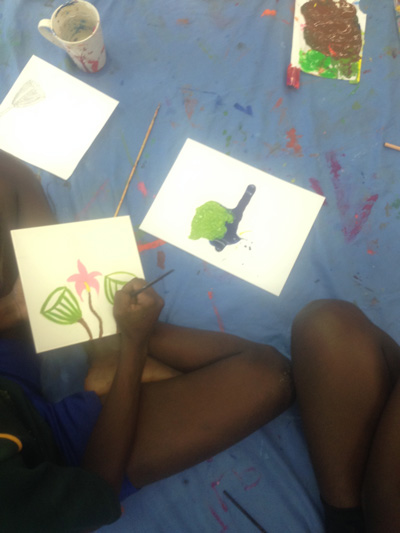
This is just one of the many examples of authentic learning here at St Francis Xavier. With so much beauty mere metres from the front gate, the opportunities for learning outside of the classroom walls are endless.
And usually, these ‘classrooms’ are better for literacy development and motivation levels.
Happy students = confident students.
Confident students = enthusiastic learners.
And how could these kids not be enthusiastic with lessons such as these!? I wanted to go for a drive one night and had considered borrowing my friends’ 4WD to do so. A colleague warned me; “Look out for the buffalos.”
And she wasn’t kidding. Buffalos, crocs, snakes, dingoes, roos… I was in a part of the world where the wildlife is abundant – it was all so different here! I exclaimed as such to another colleague and he surmised it beautifully with just a few words; “Everything here is extreme.” Yep, even the teaching.
But as challenging as some days may be, there is so much goodness inside this school. The teachers know the rewards and they celebrate these teaching and learning successes with their students and colleagues. These moments are Golden Proof that they have made an educational difference to the lives of their kids. And it is a beautiful thing.
I will never forget my time at Nauiyu and I feel very blessed that I was able to experience this goodness first-hand. But truth be told: I was mostly grateful that I didn’t have the dilemma of deciding whether one should or should not smile at a crocodile…
Well done St. Francis Xavier – you are a Stella School!
*Note: names have been changed for privacy reasons.
By Tilka Brown
©The Language Toolbox
For more information about St Francis Xavier Catholic School, please see their school website: http://www.sfxnt.catholic.edu.au


